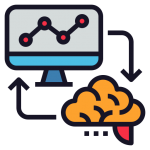
What is Process Fragmentation?
‘Process fragmentation happens when business‑critical processes are not managed in a unified workflow. They become a series of handoffs among departments, teams and systems, introducing a risk of error, mistakes and delay with each handoff.” Business Process Management Institute
Process Fragmentation can occur across many of the key elements within a business and include:
Physical fragmentation such as different geographical locations
Cultural fragmentation arising from different regions, countries or departments within an organisation (e.g., Sales versus accounts)
IT Fragmentation such as legacy systems versus new systems or cloud versus on-premise
Lack of process measurement, metrics, and objective data
Understanding the four main areas where fragmentation can exist is important. However, the most critical element is capturing objective data and studying the results of where fragmentation is creating friction and flow issues.
Silo Structure and Process Enforcement
Traditionally most organisations still concentrate their power in vertical units, whether generated through organic growth or through acquisition. These vertical units can often become silos that operate as functional islands that deliver a functional output within the process chain.
Typical Silo’s include:
· Sales | · Procurement |
· Accounts | · Warehousing |
· Manufacturing | · Customer Services |
· HR | · Payroll |
Even within defined silos, multiple functions and mini-Silos can exist such as Account Payables (AP) and Account Receivables (AR) if there is no joined up process flow.
Systems Fragmentation
Typically, when processes grow organically over time, ERP workflows can become a complex series of handoffs between business functions, job roles and information systems. This is particularly relevant when organisations use multiple systems of record such as Oracle, SAP, ServiceNow, SalesForce….
Over time the systems and applications are customised and enhanced in response to business strategy changes, compliance, security and a wide range of other drivers that move the business processes away from the original process path.
Each handoff or work around represents a possibility to introduce mistakes, delays and added cost which all contribute to further organisational and process complexity. Devoid of a fully integrated process workflow and full understanding of all the variables and metrics within the process, value deteriorates and system complexity increases.
The potential for further friction and resistance increases again as tactical individual work arounds, whilst satisfying a need locally, fail to recognise the upstream and downstream consequences of changing the flow and this impacts the efficiency of the complete system.
Fragmented Process Flows are like a dammed stream
Processes that are fragmented across the organisation are like dams that block a stream or river and prevent a smooth flow of water. Eventually the water backs up and find other routes to travel down, however if this outside of the required course that the stream needs to follow it becomes a problem leading to localised flooding or breaking through to areas not requiring water and without any formal control.
So how do you find where those dammed processes are?
As with any business change exercise, identifying where to start is the first major hurdle for stakeholders and managers to contend with. Typical engagements involve teams of ‘Process Documenters’ who map out the ‘as-is’ to the ‘to-be’, taking up valuable time and resources with interviewing everyone in the process chain.
Not only is this very time consuming and frustrating for those needing to perform their day jobs, but it also typically fails to capture all of the process flows including the workarounds and exceptions. This creates a misunderstanding of the scale of the issue at best and at worst means that any future defined strategy is doomed to failure as it does not cater for the real world but rather the more limited perceived one. Therefore, process improvement projects only part solve the problem.
The Future is Process Mining
There is a solution and service that allows you to look deep inside your organisations systems by utilising already captured data, making it an objective rather than subjective exercise.
Process Mining utilises Data Mining technology to replicate processes in real time and capture all the interactions and timelines of the process. This gives an holistic oversight across the process landscape and allows changes to be tested and modelled before implemented into production. Process Mining allows a complete view of the end to process including all upstream and downstream components. This is particularly important where the process flow touches multiple systems of record such as Oracle, SAP, Salesforce, ServiceNow….
The level of detail and understanding of the complexity of the internal workings with the ability to capture all the process touch points and interactions empowers stakeholders and users with the ability to make changes and deliver significantly improved outcomes.
Summary
Process Mining is a next generation Digital transformation product that enables accurate assessments and fully measurable analysis of process flows with captured systems data. It allows organisations to predict outcomes before changes are made and once changes have been made measure them against the expected results.
For further information on how Process Mining can help your organisation please contact Jim Brown at ONQU Automation at jim@onquautomation.com or phone 0121 803 8808
For further information on ONQU Process Tuning Services please contact Jim Brown at hello@onquautomation.com or visit www.onquautomation.com
About ONQU Automation
ONQU Automation is a specialist delivery partner for UiPath Robotic Process Automation (RPA), Process Mining and ABBYY Intelligent Document Solutions.
Operating from a Head Office in Birmingham (UK) and with bases in London (UK) for automation and Kerala (India) for managed RPA, Oracle services and support, ONQU delivers a wide range of discovery, consultancy and support services for whatever stage of the automation or support journey organisations are on.

Accurate Process Mapping
Traditional process capture and mapping relied on manual task, out dated documentation and subjective data.
Process mining uses accurate systems data.

Make Fact Based Decisions
Data is king and accurate data turns business decision making from an art form to a measurable, accurate and positive value driven exercise . Let your managers and executives decide with facts.

Increase Process Efficiency
Significantly ibcrease the effeciency of your processes and internal work functions. Process Mining will help you deliver value faster through process excellence.

Real Life Process View
Once the systems data has been captured an interrogated a real world, real life functional map can be created and reviewed.
A working model shows where there is process friction, lack of productivity and compliance.

Improve Worker Interaction
With data mining you can identify where your workers can spend the most productive time and where they don’t need to get involved. Free them from the drudgery of data tasks.

Cloud or Onsite
As with any modern technology your business can operate process mining in the cloud or within your own datacentre. This allows to manage resoruces more effectively so you can start smll and scale with success.

Significant Time Saving
Process Mining delivers a full understanding and comprehensive ovewrview of the prcesses that exist within your organisation. No longer do process reviews take months of interviews and long documentation reviews.

Improve Customer Service
Free your customer services team from undertaking processes that don’t require human attention or interaction. Remove processes that don’t add customer value.

Create Value
As with any investment the proposed outcome must be measured, monitored and compared. Because a process can be isolated then modelled chnages to the process or when automated can demostratre accuratley how much value has been achieved.

Contact Us
0121 803 8808
3 Gatsby Court, 172 Holiday Street, Birmingham
Business – Monday-Friday: 8am – 6pm
Get Started
For a Process Mining Demonstration and discussion please click here
